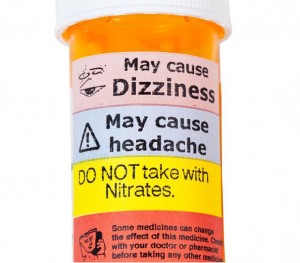NSAIDs for Neck or Back Pain: Helpful or Harmful to You?
Featured on SpineUniverse.com
Written by Lali Sekhon, MD, PhD, FACS, FAANS
The US Food and Drug Administration (FDA) recently released an important warning for people who take non-aspirin nonsteroidal anti-inflammatory drugs (NSAIDs). The FDA warns that non-aspirin NSAIDs increase the chance of a heart attack or stroke, and therefore, has strengthened labeling on these drugs.
- If you are taking a non-aspirin NSAID, and you experience chest pain, shortness of breath, difficulty breathing, slurred speech, or weakness in one part or side of your body, seek immediate medical attention.
 What to Tell Your Doctor; Keep Yourself Informed
What to Tell Your Doctor; Keep Yourself Informed
Make it a point to be sure you inform your doctor of all your medical conditions and medications you take before taking an NSAID. If you take low-dose aspirin, be aware that some NSAIDs can interfere with its protective effect against heart attack and stroke.
Read the instructions about over-the-counter (OTC) and prescription medications provided by your pharmacist as well as additional information that may be included with the drug (eg, patient insert, full prescribing information). If you experience any side effects or have questions or concerns, consult your doctor or pharmacist.
If you decide to stay on non-aspirin NSAIDs then it is important to see your doctor (eg, family doctor, primary care physician) every three months or so because in a small number of people, NSAIDs can raise blood pressure and effect kidney function. This is uncommon but needs to be looked for by your doctor.
About Non-steroidal Anti-inflammatory Drugs
If you’ve had back or neck pain, chances are you’ve taken a nonsteroidal anti-inflammatory drug, or NSAID. Several are available as OTC formulations and are often the first treatment choice for people with musculoskeletal pain. Aspirin is the original NSAID; other OTC NSAIDs include ibuprofen (Motrin®, Advil®, and others) and naproxen (Aleve®). If pain persists or worsens despite OTC treatment, a visit to the doctor may result in a prescription-strength NSAID.
Benefits of NSAIDs
Your doctor may recommend or prescribe an NSAID as the first-line treatment for many spine-related conditions such as sciatica, herniated disc, spondylosis (osteoarthritis of the spine), lower back sprain and strain, and whiplash. These drugs can be quite effective in relieving inflammation and pain. NSAIDs available by prescription include:
- celecoxib (Celebrex®), which is a COX-2 inhibitor (it blocks the action of a certain molecule, cyclooxygenase)
- diclofenac (Voltaren®, Cataflam®)
- meloxicam (Mobic®)
- other formulations of naproxen (Naprosyn®, Anaprox®)
- oxaprozin (Daypro®)
- indomethacin (Indocin®)
- fenoprofen (Nalfon®)
- flurbiprofen (Ansaid®)
- ketorolac (Sprix®)
- mefenamic acid (Ponstel®)
- sulindac (Clinoril®)
- piroxicam (Feldene®)
Some prescription NSAIDs, such as nabumetone, ketoprofen, and diflunisal, are available only as generics.
The Risks of NSAIDs
Widely used to reduce pain and inflammation; most NSAIDs had been considered relatively safe, especially when used for short periods and at lower doses. However, like most medications, they do have their share of side effects, particularly bleeding gastrointestinal (digestive) problems. Of more concern is their potential risk for heart attack and stroke. Certain NSAIDs, most notably rofecoxib (Vioxx®), were taken off the market because of its potential to cause stroke and heart attack, sometimes fatal.
New Information Reveals Higher Risks
Non-aspirin NSAIDs have been found to be associated with an increased risk of heart attack and stroke. The US Food and Drug Administration (FDA) has already required (since 2005) a boxed warning appear on all prescription and OTC NSAIDs.
Recent studies have revealed new safety information, and the FDA wants drug warnings to be strengthened. The drug labels for all non-aspirin NSAIDs must be updated to take into account the new findings on heart attack and stroke risk. The updated information will include:
- The risk of heart attack or stroke can occur as early as the first weeks of using an NSAID and may increase with longer use.
- The risk seems to be greater at higher doses.
- Although it was previously believed that all NSAIDs may have a similar risk, new information makes it less clear that the risk for heart attack or stroke is similar for all NSAIDs. However, this information does not determine whether the risk of any NSAID is truly greater or less than that of any other particular NSAID.
- The risk of heart attack or stroke can be higher in patients taking NSAIDs, whether or not they have heart disease or risk factors for heart disease. This finding is supported by many studies; estimates of how much the risk is increased vary, based on the drugs and the doses studied.
- Patients with heart disease or risk factors for it generally have a greater potential for suffering a heart attack or stroke after NSAID use than patients without heart disease or these risk factors, since they have a higher risk at baseline.
- Individuals who took NSAIDs following their first heart attack were more likely to die in the first year after the heart attack compared with those who had not been treated with NSAIDs after their first heart attack.
- NSAID use increases the risk of heart failure.
